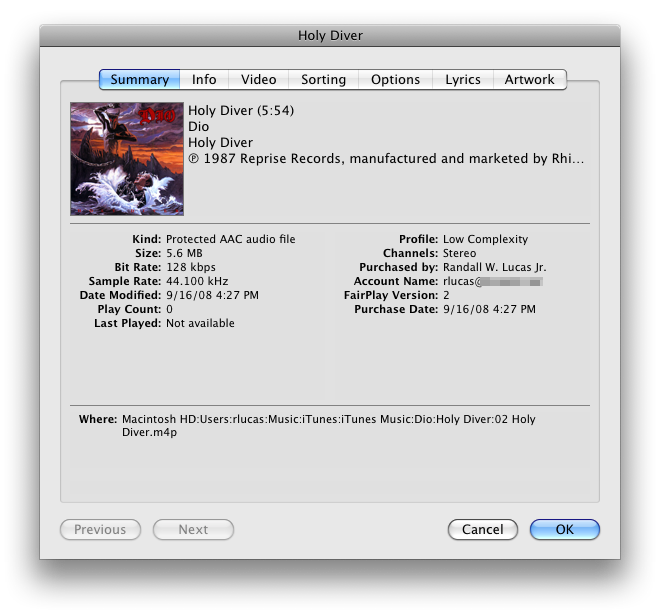Was looking today at a Facebook email (yuck) exchange regarding heavy metal and hard rock with an overseas pen pal. One of the links traded was to Ronnie James Dio’s “Holy Diver” video, a rockin’-ass metal song with laughably horrific production values in the vid.
That video in question I had found as a “related video” while surfing some other metal (probably Sabbath) on YouTube.
You heard me right: I probably never would have found out about Holy Diver if not for a bunch of dubiously-legit uploads to YouTube, which uploads, through the collective intelligence of commenting, tagging, and merely self-serving passively surfing users, became woven into a preferences graph that drove me into Dio’s grip. (Forgive me.)
WOE IS THE F-ING RECORD COMPANIES, THEY HAVE LOST SO MUCH REVENUE BOO HOO HOO BECAUSE I WATCHED A 20-YEAR-OUTDATED ROCK VID ON YOUTUBE, flail and rend garments etc.
Oh, wait — no, that’s not correct:

Yep, I bought the song. That is: the system works. Exactly like folks like Steve Jobs and the YouTube boys and your humble correspondent have been saying. There’s a place for freedom, and a place for commerce, and they can coexist. My anonymous and unknown friend in cyberspace puts up a crappy VHS-dub of Dio to share with me, I discover and rock out to it, and I buy the song.
But Warner Music Group (WMG) is operating on a plainly brain-dead policy. For instead of promoting that virtuous cycle above, they have chosen as a matter of policy to piss all over my unknown cyber-friend, me, RJD’s bank account, and indeed all precedents of good internet behavior. They have used the threat of violence-through-the-courts to have the link broken, and replaced with “This video is no longer available due to a copyright claim by WMG.” In WMG’s preferred universe, I never discover Holy Diver, RJD never gets his 10c or whatever from iTunes, and you never have to read this rant.
So, let me review the options WMG has:
1. Benign neglect toward music-sharing (especially of old and/or non-premium formats). Begets wider distribution of the catalog. Enables an increase in fan discovery and delight. Drives marginal purchases based upon that discovery and delight, and encourages the budding polyglot.
2. Relentless malignancy toward music-sharing. Squelches wider distribution of the catalog. Precludes an increase in discovery and reduces delight. Increases dependence on old, broken business model of top-40 radio and brick-and-mortar distributors, and cultivates mono-consumers who cleave to niche preferences.
In fair-mindedness, I must back down from the “brain-dead” accusation (see also my self-moderation imperative from earlier posts). There is, to be fair, one very good remaining reason why WMG might rationally choose #2 above. That is the legal doctrine that rightsholders like WMG must assert their rights or face losing them due to estoppel (I may have the legalese wrong). In other words, WMG may well have right-thinking, option #1 favoring executives, but if the general counsel raises the spectre of losing all copyrights, then that fear could drive an otherwise bad decision.
What we need is a law or court decision that provides some limited protection to copyright holders: a failure to enforce rights in one specific medium, format, or type of venue shall not be deemed a waiver of rights in any other medium, format, or type of venue. Then, WMG could let YouTube run amuck, with some sort of implicit understanding that HD videos or 128k audio would provoke legal action, but that sub-par stuff would not.
Otherwise, we end up in world where online video is Hulu, not YouTube. Don’t get me wrong — Hulu is fine for what it is: a way to rot your brain with mainstream media candy. It’s fun for catching “30 Rock” or “The Daily Show.” But YouTube is different and more important, culturally and economically, than Hulu, because it enables and empowers a different class of people to participate in the (potentially-)mass media.